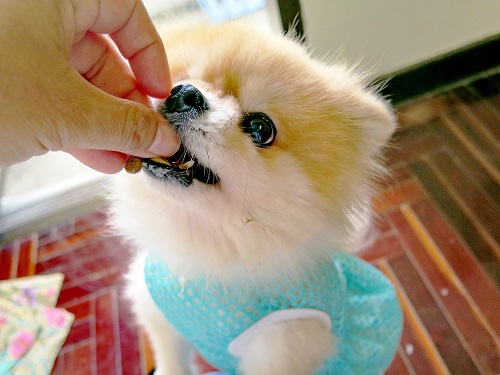Can Dogs Eat Jelly? Can it be a sweet treat for pooches on a daily basis? Time to find out all the answers!
If you want to give it as a treat to your four-legged friend, then there are certain things that you need to be aware of. Let’s have a look at them.
What is a Jelly?

Jelly is a sweet, gelatinous dessert made by combining fruit juice, sugar, and gelatin. The mixture is heated until the gelatin dissolves and then chilled until it solidifies. It is often served as a dessert or a snack and comes in a variety of flavors and colors.
Can Dogs Eat Jelly?
So, Can Dogs Eat Jelly? While the jelly is not toxic to dogs, it is not recommended to feed it to them regularly or in large amounts. This is because jelly is typically high in sugar and offers little nutritional value to dogs.
Consuming large amounts of sugar can lead to obesity, dental problems, and other health issues in dogs.
A Few Health Concerns
Feeding jelly to dogs can pose a few health concerns, including:
- High Sugar Content: Jelly is typically high in sugar, which can lead to weight gain, obesity, and other health issues in dogs. Excessive sugar intake can also increase the risk of diabetes, dental problems, and other health problems.
- Digestive Upset: Consuming large amounts of jelly or other sugary foods can cause digestive upset in dogs, including diarrhea, vomiting, and abdominal pain.
- Xylitol Poisoning: Some jellies may contain xylitol, an artificial sweetener that is toxic to dogs. Ingesting xylitol can cause a sudden drop in blood sugar levels, seizures, liver failure, and even death.
- Obesity: Regularly feeding your dog high-sugar treats like jelly can contribute to obesity, which can lead to a host of other health problems, including joint pain, heart disease, and diabetes.
- Dental Problems: The high sugar content in jelly can also contribute to dental problems in dogs, including tooth decay and gum disease.
Take care of all these points before asking – Can Dogs Eat Jelly?
What Should I Do If My Dog Ate Jelly?

If your dog has eaten a small amount of jelly, it is likely that it will not experience any serious health problems. However, if they have eaten a large amount or if the jelly contains xylitol, you should take action immediately.
- Check the ingredients: Look at the ingredients list on the jar of jelly to see if it contains xylitol or any other potentially harmful ingredients. If it does, contact your veterinarian right away.
- Monitor your dog: Keep an eye on your dog for any signs of digestive upset, such as vomiting, diarrhea, or abdominal pain. If you notice any of these symptoms, contact your veterinarian.
- Offer water: Provide your dog with plenty of fresh water to help flush out its system.
- Contact your veterinarian: If you are unsure whether your dog has eaten a toxic amount of jelly or if they are showing any signs of illness, contact your veterinarian immediately.
What Makes Jelly Toxic to Dogs?
Jelly itself is not toxic to dogs, but some types of jelly may contain ingredients that can be harmful to them. Here are some ingredients commonly found in jelly that can be toxic to dogs:
- Artificial Colors and Flavors: Some jellies may contain artificial colors and flavors, which can cause digestive upset in dogs.
- Grapes or Raisins: Some jellies may contain grapes or raisins, which can be toxic to dogs and cause kidney damage.
- Preservatives: Some jellies may contain preservatives like potassium sorbate, which can cause digestive upset in dogs.
Is Homemade Jelly Good For Dogs?
Homemade jelly may be better for dogs than store-bought jelly because you can control the ingredients and the amount of sugar that goes into it. Here are some things to consider before giving your dog homemade jelly:
- Sugar content: Homemade jelly is typically made with sugar or another sweetener, so it is important to limit your dog’s intake to avoid weight gain and other health problems.
- Fruit content: Some fruits used to make jellies, such as grapes and raisins, can be toxic to dogs, so it is important to use safe fruits like strawberries, blueberries, or raspberries.
- Other ingredients: Homemade jelly may contain other ingredients that are not safe for dogs, such as artificial sweeteners or preservatives.
If you do decide to give your dog homemade jelly as a treat, make sure to feed it in moderation and consult with your veterinarian to ensure that it is a safe addition to your dog’s diet. Remember that treats should not make up more than 10% of your dog’s daily caloric intake.
Can Dogs Have Grape Jelly?
No, it is not recommended to feed grape jelly to dogs. Grapes and raisins can be toxic to dogs and can cause kidney failure, and grape jelly may contain enough grape residue to be harmful. It is best to avoid giving grape jelly to dogs and to choose safer alternatives.
Read here: Can Dogs Eat Grapes Jelly | Is Grape Jelly Safe for Dogs
Can Dogs Eat Strawberry Jelly?
Dogs can eat strawberry jelly in small amounts, but it is not recommended to make it a regular part of their diet. Strawberry jelly is high in sugar and may contain other harmful ingredients, so it is important to check the label before feeding it to your dog.
Can Dogs Have Raspberry Jelly?
Dogs can eat raspberry jelly in moderation, but it is important to check the label for any harmful ingredients and to avoid giving it to them on a regular basis due to its high sugar content.
Are Jelly Tots Safe For Dogs?
It is not recommended to give Jelly Tots or any other candy to dogs. These types of treats are high in sugar and may contain artificial colors, flavors, and other ingredients that can be harmful to dogs.
Additionally, the small size of Jelly Tots may pose a choking hazard or cause digestive issues if swallowed whole.
Can Dogs Eat Jelly Beans?
It is not recommended to feed jelly beans or any other candy to dogs. Jelly beans are high in sugar and may contain artificial colors, flavors, and other harmful ingredients that can be toxic to dogs.
Quick Takeaways
So, Can Dogs Eat Jelly? Jelly and jello are not recommended for dogs due to their high sugar content, which can cause insulin spikes and potentially lead to diabetes. While these foods are not necessarily toxic, the presence of xylitol in some jelly products can be dangerous for dogs.
It is better to avoid giving jelly to dogs and opt for low-sugar homemade treats made with fruit instead. This will provide a safer and more nutritious option for your furry friend.
